The Berklee International Network: 20 Years of Global Outreach

Photo by Dave Green
Vocalists Barbara Silva, Rebecca Chubay, and Linnéa Lundgren perform at the BIN concert.
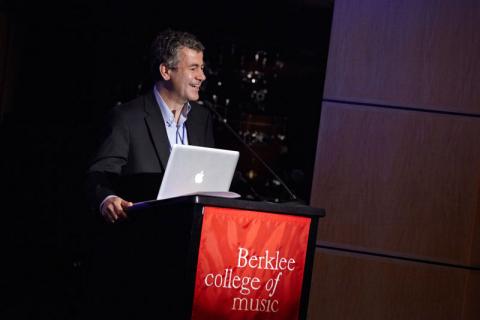
Photo by Dave Green
Guillermo Cisneros, vice president of global initiatives, speaks at the opening ceremony of this year's BIN summit.
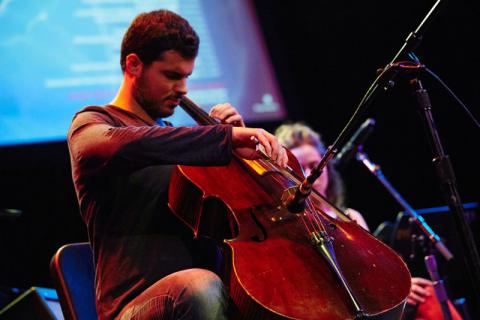
Photo by Dave Green
Cellist Nasseem Alatrash
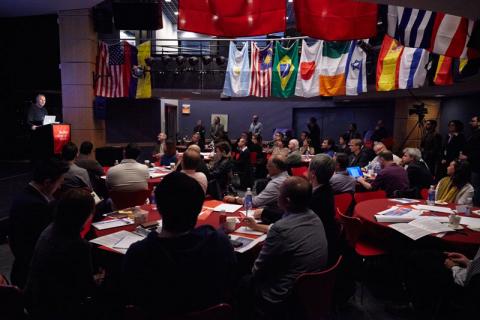
Photo by Dave Green
Berklee president Roger H. Brown addresses the BIN partners.
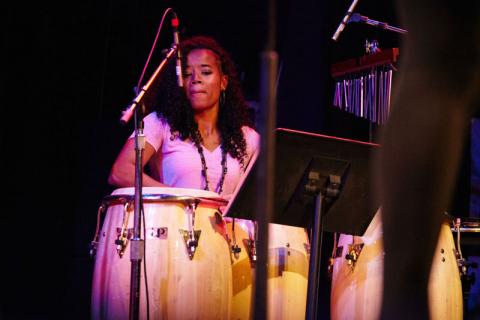
Photo by Dave Green
Anne Silva performs.
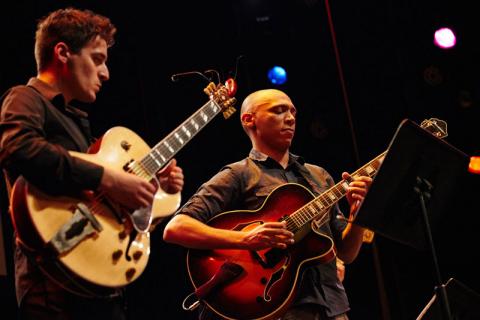
Photo by Dave Green
Guitarist Leandro Pellegrino, right, ame to Berklee from Conservatório Musical Souza Lima in São Paulo, Brazil, and won the Montreux Jazz Festival Electric Guitar Competition this summer.
Twenty years ago, after nearly a half-century of making a name for itself in Boston as a leader in contemporary music education, Berklee formed the Berklee International Network (BIN) to formally take its mission and message global.
“This is an initiative started in the times of (former president) Lee Berk and (then dean of curriculum) Gary Burton. (The former vice president for international programs) Larry Monroe initiated the creation of the network and led its growth for many years, with the help—and later the leadership of—Greg Badolato. We are proud of this heritage which contributed in a such a decisive way to the internationalization of Berklee,” said Guillermo Cisneros, vice president of global initiatives.
The members of the BIN are Berklee’s ambassadors in the world, helping to seek talented students, and connecting with diverse and evolving music traditions, as well as spreading Berklee’s influence in the music industry at a global level. Through the BIN, students from partner schools can transfer credit and study at Berklee. In addition, through collaborative programming (workshops, master classes, and concerts), Berklee faculty and students travel to partner schools, further extending Berklee’s global reach by introducing the college to international musicians.
Now, two decades later, the BIN has grown from three partner schools to 19. The network recently celebrated its 20th anniversary by hosting its biannual summit at Berklee, which culminated in a ceremony and concert.
“It was a moment for celebration and looking forward,” said Cisneros, noting that Berklee welcomed six new schools to the fold. “It was a moment for thinking together about the Berklee mission to bring contemporary music education to as many people in the world as possible as well achieving the strategic goals defined by Berklee president Roger H. Brown in the vision of becoming the world’s leader of contemporary music education and developing the future global music industry.”
Having all the partner representatives in one room underscores the novelty of such a network, Cisneros said. All together, the network is composed of 15,000 full-time students each year, not including online or part-time students. “Nobody has a network like this,” Cisneros said.
A Mutually Beneficial Exchange
While expanding its reach, the network has remained particularly steeped in Berklee connections. Of the 19 partner schools from 18 different countries, all but two were either founded by Berklee alumni or boast an academic leader who graduated from Berklee.
“The students who come from our partner schools represent the best that Berklee wants to see,” said Jason Camelio, Berklee’s senior director of global initiatives. He pointed to pianist Chaeree Kaang and trumpeter Paul Sanchez, both Presidential Scholars, and Leandro Pellegrino, a guitarist in the Berklee Global Jazz Institute who came to Berklee from Conservatório Musical Souza Lima in São Paulo, Brazil, and won the Montreux Jazz Festival Electric Guitar Competition this summer, the top prize in the world for jazz guitarists.
“It’s a credit to these schools that their teaching and their work is representing what Berklee wants to see in the world, which is to be the very best,” he said.
The exchange is mutually beneficial. The BIN partner school students get an immeasurable benefit: studying contemporary music at Berklee.
For Kang, who came to Berklee by way of Seoul Jazz Academy, studying at Berklee represented a chance to follow in the footsteps of musicians she admires, such as Quincy Jones and Esperanza Spalding, as well as to collaborate with many different types of musicians. “Every day here is a really special day,” she said.
Irma Seleman fell in love with R&B and soul music at the BIN partner school International College of Music in Kuala Lumpur, Malaysia. After studying for two years there, she transferred to Berklee. Here, she has been able to take her music to the next level by studying performance and contemporary writing and production. “Berklee has helped me a lot with translating my ideas onto paper, from writing and arranging to producing,” she said. In addition, Berklee’s international component has been invaluable and allowed her to put together a band with students from Spain, Italy, Malaysia, and Norway.
Students who come to Berklee through BIN also have access to a robust faculty.
“You come here to study with amazing faculty members who have these brilliant careers,” Camelio said. “One part is to be in the classroom with faculty and the other part is to be on stage with them or in the recording studio, or them helping you get that job, which you dreamed about having. That’s why people come here. It’s not that it’s not happening in other places in the world. It’s just happening at a higher level here.”
BIN alumni continue to feed the engine, a testament to the network’s value.
Barcelona was one of the BIN’s first partner schools. Berklee alumnus Iñaki Sandoval is an illustration of the BIN coming full-circle; he came to Berklee through the BIN and is now back home as the academic director L’AULA de Música Moderna in Barcelona. “It’s an example of how the BIN works,” he said. “We are regularly sending students to Berklee every year. They are successful even though it’s a different curriculum and a different culture. Artistically, this is the place to come. You have 4,000 people. You can play every night. And there’s a whole international global vision.”
The BIN’s newest partner, the Baron School of Music in Hong Kong, envisions the partnership will elevate its and Berklee’s appeal to prospective students. In a place like Hong Kong, which is steeped in classical tradition, Baron offers the foundations of a contemporary music education, which students can pursue further at Berklee. “Pop music education is in the beginning stages in China. In Hong Kong, our advantage is location; we’re already a developed city. There’s a huge market,” said Berklee alumnus Ronald Ng, director and president of Baron. “Our mission is to provide a bridge to these students.”
New Initiatives
Meanwhile, BIN partners are busy augmenting the network through new initiatives. The Conservatorio Musical Souza Lima in São Paulo, Brazil, is creating a network for Latin American music educators that models the BIN. “It’s helping younger schools across Latin America bring up their level of teaching and open up opportunities for their students, which could result in those students coming to Berklee, whether it be for an online degree or summer program, coming as an undergraduate student, or pursuing graduate studies in Valencia,” said Camelio.
In Ecuador, the Universidad San Francisco de Quito—College of Music, whose director is alumnus Esteban Molina ’92, is raising money for scholarships to send faculty to master’s programs at Berklee’s campus in Valencia.
Looking forward, the BIN will continue to evolve. Cisneros envisions an enhanced sense of a truly global network. “Instead of being just different schools working together, we expect it will be more of a community, with students moving from one partner to another.”
Ultimately, this will translate to more participation. “We expect to find even more talented students and help make music education more accessible to more people in the world. We are sure that the next 20 years of the BIN are going to be as exciting as the first ones.”
